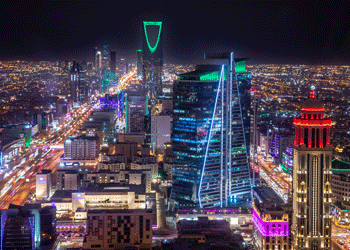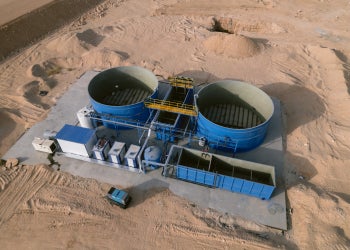UAE begins massive reverse osmosis buildup
11 April 2023
 This package on the UAE's water sector also includes:
This package on the UAE's water sector also includes:
> Dewa extends Hassyan IWP bid deadline
> Adnoc resumes Project Wave negotiations
> Sharjah issues first independent water tender
> Ewec rules out solar in desalination projects
> French/local team wins contract to build Mirfa 2 IWP
> Adnoc selects Cobra-led team for PPP project
State utilities in the UAE are seeking to increase the share of seawater reverse osmosis (SWRO) technology in the overall capacity of their desalination plants in line with their carbon emission reduction targets and the UAE’s net-zero by 2050 goal.
This will end the domination of water production capacity by thermal desalination plants over the past decades.
The demand for additional SWRO capacity is especially evident in Abu Dhabi, where nearly half of the existing water desalination capacity will come out of contract between 2025 and 2029.
The power- and water-purchase agreements (P/WPA) for four major utility plants in Abu Dhabi, with a total combined water desalination capacity of 441 million imperial gallons a day (MIGD), will expire during this period.
Unlike the thermal power plant components of these independent water and power projects (IWPPs), which are subject to extension negotiations, the state utility Emirates Water & Electricity Company (Ewec) is inclined to dismantle all thermal desalination plants associated with these assets – or convert them into SWRO plants – upon the expiry of their contracts. This strategy aligns with its goal to halve its carbon emissions.
Over the next two to four years, Ewec envisages putting 290MIGD of SWRO capacity in place. This is in addition to the Taweelah SWRO plant’s remaining 100MIGD of capacity that is yet to enter commercial operation. Once this plant is at full capacity, it will plug in the capacity from Taweelah A2, the emirate’s first thermal IWPP, which was mothballed in 2021.
Recent SWRO projects in Abu Dhabi include the 120MIGD Mirfa 2 independent water producer (IWP) project, which France’s Engie is developing; the 70MIGD Shuweihat 4 IWPHudayriat and Saadiyat islands, which will each have a capacity of 50MIGD.
RELATED READ: Mirfa 2 award sends positive market signal
Both Mirfa 2 and Shuweihat 4 have a target commercial operation date of 2025, while the two Abu Dhabi Islands IWP projects are expected to provide replacement capacity for the Sas al-Nakhl plant, whose contract expires in 2027.
Longer term, Ewec will need to procure 494MIGD of SWRO capacity by 2036, under the base-case scenario of its 2023-29 Statement of Future Capacity Requirements.
Demand fluctuations
Demand for desalinated water in Abu Dhabi over the short term is anticipated to decrease from just under 800MIGD in 2022 to 764MIGD this year. This is due to reduced exports to Etihad Water & Electricity (Ewe), which is commissioning its first 150MIGD IWP in Umm al-Quwain.
Demand is expected to grow slowly between 2023 and 2029, when it is projected to reach 805MIGD. This is just slightly higher than in 2022, primarily due to recycled water replacing desalinated water as the dominant irrigation supply source.
In Dubai, the procurement process is under way for the 120MIGD Hassyan IWP. The contract for the emirate’s first IWP was tendered before and awarded in 2020, but the project stalled and Dewa relaunched the tender in 2022.
Four teams led by Engie, Saudi Arabia’s Acwa Power, Spain/South Korea’s GS Inima and Metito are understood to be among those qualified to bid for the contract.
The project has a planned capacity of 120MIGD, with an alternative proposal for an aggregate capacity of 180MIGD. Dewa expects to commission it in phases between 2025 and 2026.
The facility is part of Dewa’s plan to increase its water desalination production capacity from 490MIGD to 750MIGD by 2030. By this time, it envisages RO to account for 41 per cent of its overall desalination capacity, in support of Dubai’s 2050 Clean Energy Strategy.
Northern emirates
As previously stated, the Northern Emirates’ first 150MIGD IWP in Umm al-Quwain is undergoing commissioning. This frees up capacity for Abu Dhabi, which has been exporting both water and electricity to the smaller northern UAE emirates.
In early April, Sharjah Electricity & Water Authority also issued the request for proposals for the contract to develop Sharjah’s first IWP. Located next to an existing desalination plant in Hamriyah, the planned IWP will have a capacity of 90MIGD.
 UAE power sector shapes up ahead of Cop28
UAE power sector shapes up ahead of Cop28
Other projects
Abu Dhabi Sewerage Services Company is evaluating proposals received earlier this year for a contract to design and build a treated sewage effluent (TSE) polishing plant in Al-Wathba.
The plant is expected to have a design capacity of 700,000 cubic metres a day (cm/d), with the potential to expand this capacity to 950,000 cm/d in a subsequent phase. The TSE facility will produce water for higher-end applications than the TSE produced at standard sewage treatment plants.
The largest individual projects within the sector are the two seawater treatment plants, frequently called Project Wave, being procured by Abu Dhabi National Oil Company (Adnoc).
The Mirfa and Al-Nouf nanofiltration plants and their associated utilities have budgets of between $2bn and $2.5bn each. The Mirfa package is in the advanced procurement stage, with negotiations continuing between Adnoc and the shortlisted bidders as this article is published.
This month's special report on the UAE also includes:
> UAE power sector shapes up ahead of Cop28
> Strategic Adnoc projects register notable progress
> UAE lenders chart a route to growth
Exclusive from Meed
-
 Solar deals signal Saudi Arabia’s energy ambitions
Solar deals signal Saudi Arabia’s energy ambitions13 February 2026
-
 Saudi Arabia appoints new investment minister
Saudi Arabia appoints new investment minister13 February 2026
-
 Indian firm wins major Oman substation contract
Indian firm wins major Oman substation contract12 February 2026
-
 Developers appoint contractor for $500m wastewater treatment project
Developers appoint contractor for $500m wastewater treatment project12 February 2026
-
 Dewa raises Empower stake in $1.41bn deal
Dewa raises Empower stake in $1.41bn deal12 February 2026
All of this is only 1% of what MEED.com has to offer
Subscribe now and unlock all the 153,671 articles on MEED.com
- All the latest news, data, and market intelligence across MENA at your fingerprints
- First-hand updates and inside information on projects, clients and competitors that matter to you
- 20 years' archive of information, data, and news for you to access at your convenience
- Strategize to succeed and minimise risks with timely analysis of current and future market trends

Related Articles
-
 Solar deals signal Saudi Arabia’s energy ambitions
Solar deals signal Saudi Arabia’s energy ambitions13 February 2026
 Commentary
Commentary
Mark Dowdall
Power & water editorSaudi Arabia’s recent agreement to build $2bn-worth of solar power plants in Turkiye is the latest sign that the kingdom’s energy influence is changing.
Historically, this was measured in oil barrels and export volumes. Increasingly, this is extending to capital, structuring expertise and the ability to deliver record-low tariffs in competitive markets.
Announcing the deal, Turkish Energy Minister Alparslan Bayraktar said tariffs for the plants would be the country’s lowest on record, with electricity purchased under 25-year power purchase agreements.
It followed another announcement, in January, that Acwa is investing $200m to build a large-scale solar photovoltaic (PV) plant in the Philippines.
Whether Saudi-backed companies ultimately retain long-term stakes or primarily develop and build the assets, their role at the front end is significant.
Sponsors that bring sovereign backing, clear procurement processes and access to low-cost financing can influence tariffs and contract terms from the outset.
There is also a geopolitical layer. Investing in Turkiye, or anywhere for that matter, strengthens political and economic ties at a time when regional alignments are shifting.
Energy infrastructure is also long-term by its nature. It connects ministries, regulators, lenders and operators in relationships that often extend well beyond a single transaction.
Saudi Arabia has spent the past few years refining its approach to pricing, structuring and financing large-scale renewables at home.
Exporting that expertise may not rival oil in scale or visibility, but it does signal that Saudi Arabia is becoming more than just an energy supplier.
Increasingly, it is becoming a participant in how other countries design and finance their energy transitions. That influence is still significant.
https://image.digitalinsightresearch.in/uploads/NewsArticle/15645903/main.jpg -
 Saudi Arabia appoints new investment minister
Saudi Arabia appoints new investment minister13 February 2026
Register for MEED’s 14-day trial access
King Salman Bin Abdulaziz Al-Saud has made a series of senior government changes, including Khalid Al-Falih leaving his role as investment minister to become minister of state and a member of the cabinet.
Al-Falih has been replaced by Fahad Al-Saif as investment minister. Al-Saif has been head of the Investment Strategy and Economic Insights Division at the Public Investment Fund (PIF) since 2024. That role involved formulating PIF’s long-term investment strategy. He has also served as head of the Global Capital Finance Division, a role he has held since joining PIF in 2021.
The change of investment minister comes at a time when securing investments has become a key priority for Saudi Arabia as it prepares to hand over more projects to the private sector for delivery.
King Salman also named Abdullah Al-Maghlouth as vice-minister of media and Abdulmohsen Al-Mazyad as vice-minister of tourism. Khalid Al-Yousef was named attorney general, and Sheikh Ali Al-Ahaideb will serve as president of the Board of Grievances.
Faihan Al-Sahli was selected as director general of the General Directorate of Investigation, while Abdulaziz Al-Arifi was chosen to lead the National Development Fund. Haytham Al-Ohali will head the Communications, Space and Technology Commission, and Fawaz Al-Sahli will chair the Transport General Authority.
https://image.digitalinsightresearch.in/uploads/NewsArticle/15645415/main.gif -
 Indian firm wins major Oman substation contract
Indian firm wins major Oman substation contract12 February 2026

India’s Larsen & Toubro has won a contract to build the Majan 400/220/132kV grid station in Oman.
Estimated to cost $100m, the project includes an associated 400kV line-in line-out underground cable from Sohar Free Zone to the Sohar Interconnector Station.
The contract was awarded by Oman Electricity Transmission Company (OETC), part of the government-owned Nama Group.
The grid station will comprise eight 400kV gas-insulated switchgear (GIS) bays, eight 220kV GIS bays and 10 132kV GIS bays at the new Sohar Free Zone substation.
The scope includes the installation of two 500MVA, 400/220kV transformers and two 500MVA, 220/132kV transformers.
Local firm Monenco Consulting Engineers was appointed in April last year to provide design and supervision services for the project.
As MEED exclusively revealed, the main contract was tendered in June, as part of three significant contracts to build new substations in the sultanate.
The second contract, worth about $35m, covers the construction of the Sultan Haitham City 132/33kV grid station and associated 132kV line-in line-out underground cables running 4 kilometres from Mabella to Mabella Industrial Zone.
The third contract, valued at about $100m, covers the construction of the Surab 400/33kV grid station and an associated 400kV line-in line-out cable from the Duqm grid station to the Mahout grid station.
Local firms Muscat Engineering Consulting and Hamed Engineering Services are consultants for the Sultan Haitham City and Surab projects, respectively.
The two remaining contracts are currently under bid evaluation, with awards expected this quarter.
https://image.digitalinsightresearch.in/uploads/NewsArticle/15638107/main.jpg -
 Developers appoint contractor for $500m wastewater treatment project
Developers appoint contractor for $500m wastewater treatment project12 February 2026

Register for MEED’s 14-day trial access
Egypt’s Orascom Construction has won the engineering, procurement and construction (EPC) contract for a major wastewater treatment project in Saudi Arabia’s Eastern Province.
A consortium of Saudi utilities provider Marafiq, the regional business of France’s Veolia and Bahrain/Saudi Arabia-based Lamar Holding is developing the $500m (SR1.875bn) industrial wastewater treatment plant (IWWTP) in Jubail Industrial City 2.
Sources close to the project confirmed the appointment to MEED, adding that the project has now entered the construction phase.
Industry sources also said that financial close on the project is expected to be reached in the coming days.
In September, the developer consortium was awarded a contract, under a 30-year concession agreement, by Saudi Aramco Total Refining & Petrochemical Company (Satorp), a joint venture of Saudi Aramco and France’s TotalEnergies.
The planned facility will treat and recycle wastewater from Satorp’s under-construction Amiral chemical derivatives complex, also in Jubail.
Marafiq, formally Power & Water Utility Company for Jubail and Yanbu, will own a 40% stake in the dedicated project company. Veolia Middle East SAS will hold a 35% stake, and Lamar Holding’s Lamar Arabia for Energy will hold the other 25%.
The planned IWWTP, which will primarily serve the $11bn sprawling Amiral chemicals zone, will implement advanced water treatment and recovery technologies to process complex industrial effluents, including spent caustic streams. Treated water will be reintegrated into the industrial processes, supporting closed-loop reuse and energy efficiency.
The project follows a concession-style model, akin to a public-private partnership (PPP), where the developer consortium invests in, builds and operates the wastewater plant over a 30-year period, with returns linked to service delivery.
Marafiq has been involved in several similar projects across Saudi Arabia, including as the sole owner of the Jubail industrial water treatment plant (IWTP8), which treats complex industrial effluents for petrochemical and heavy industrial companies.
In 2020, Saudi Services for Electro Mechanic Works was awarded the $202m main contract for the fourth expansion phase of IWTP8. Construction works on the project are expected to be completed by the end of the quarter.
 READ THE FEBRUARY 2026 MEED BUSINESS REVIEW – click here to view PDF
READ THE FEBRUARY 2026 MEED BUSINESS REVIEW – click here to view PDFSpending on oil and gas production surges; Doha’s efforts support extraordinary growth in 2026; Water sector regains momentum in 2025.
Distributed to senior decision-makers in the region and around the world, the February 2026 edition of MEED Business Review includes:
> AGENDA: Mena upstream spending set to soar> INDUSTRY REPORT: MEED's GCC water developer ranking> INDUSTRY REPORT: Pipeline boom lifts Mena water awards> MARKET FOCUS: Qatar’s strategy falls into place> CURRENT AFFAIRS: Iran protests elevate regional uncertainty> CONTRACT AWARDS: Contract awards decline in 2025> LEADERSHIP: Tomorrow’s communities must heal us, not just house us> INTERVIEW: AtkinsRealis on building faster> LEADERSHIP: Energy security starts with rethinking wasteTo see previous issues of MEED Business Review, please click herehttps://image.digitalinsightresearch.in/uploads/NewsArticle/15637523/main.jpg -
 Dewa raises Empower stake in $1.41bn deal
Dewa raises Empower stake in $1.41bn deal12 February 2026
Dubai Electricity & Water Authority (Dewa) has announced it has increased its stake in Emirates Central Cooling Systems Corporation (Empower) from 56% to 80%.
The transaction was completed through the purchase of 2.4 billion shares and the transfer of the entire ownership of Emirates Power Investment (EPI), which is wholly owned by Dubai Holding.
The total value of the deal is AED5.184bn ($1.41bn).
Empower currently holds over 80% of Dubai’s district cooling market and operates 88 district cooling plants across the emirate.
According to MEED Projects, the UAE’s district cooling sector currently has nine projects worth $1.29bn in the pre-execution phase.
Empower has ownership in four of these projects, which have a combined value of $472m.
This includes a $200 million district cooling plant at Dubai Science Park, with a total capacity of 47,000 refrigeration tonnes serving 80 buildings.
Empower signed a contract to design the plant last August, with construction scheduled to begin by the end of the first quarter of 2026.
The utility is also building a district cooling plant at Dubai Internet City.
UAE-based TMF Euro Foundations was recently appointed as the enabling and piling subcontractor for the project.
https://image.digitalinsightresearch.in/uploads/NewsArticle/15635949/main.jpg


